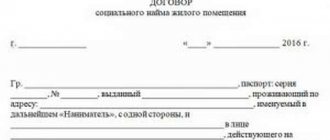Regulatory regulation
The privatization procedure is regulated by Law No. 1541-1, which was put into effect on July 4, 1991. This regulatory act defines the conditions for participation in the program for obtaining municipal property into private ownership. There are three main criteria:
- The procedure is free of charge.
- The decision to privatize is made independently and voluntarily.
- You can privatize living space once.
For many years, the Law had deadlines for implementation, which limited the possibilities of using the right to privatization. But in February 2021, this restriction was lifted so as not to infringe on the interests of those citizens who did not have time to exercise their right.
Legislative norms governing the privatization procedure establish some restrictions. According to them, the following cannot be privatized:
- Emergency residential facilities.
- Rooms located in dormitory buildings.
- Residential area, which is located on the territory of closed military camps.
- Service housing.
Other reasons for refusal are considered unfounded and are subject to challenge.
Privatization by court
In order to become the legal owner of social housing in a short time, to do everything correctly, you need to understand the order of the privatization process. Or find a qualified lawyer who specializes in working with real estate for individuals and legal entities.
So, a soldier who decides to privatize an apartment or house must have the entire necessary list of documents drawn up in accordance with the required procedural norms before starting the process. And only after that file a substantiated claim.
In case of a positive decision of the judge, after the latter has considered the circumstances of the claim presented, the court decision with the remaining documentation is transferred to the Unified State Register. After this, your property will be registered in accordance with all rules and Russian laws.
It is necessary to take into account the fact that some apartments are not available for transfer to private ownership. This includes closed army cities, emergency rooms, army dormitories, etc.
Purpose of official housing
Service housing is premises allocated by employers to their employees to temporarily solve their housing problem.
Not every employer can boast of having their own housing stock. Large organizations and enterprises purchase real estate specifically for the opportunity to attract smart specialists to work without being tied to their search geographically. Many public sector employees also live in service apartments, for example, employees of the Ministry of Defense.
Service-type housing, although provided free of charge for living, still has significant differences from social apartments. The square meters allocated by the employer are provided to the employee under a rental agreement with a clear limitation on the period of residence in it - for the duration of work. If an employee is dismissed at his own request or due to gross violations of labor discipline, he loses the right to continue to be in the premises and must leave it as soon as possible.
Despite the differences in concepts, they also have similarities. An employee who has received the right to occupy the provided square meters has the right to move his family members there; moreover, when determining the size of the premises, they must be taken into account. Residents must register at their place of residence and fulfill the duties assigned to them by the tenancy agreement, taking into account the norms of the Housing Code.
Restrictions on privatization
Privatization as a procedure cannot be applied in every case. To carry it out, certain conditions must be present. According to the law, every citizen has the right to privatize living space, but only those who live in social premises legally, that is, have registration and a social tenancy agreement concluded with the local administration, can use it. Office premises do not fit into these categories because:
- They are provided not by the state, but by a specific employer.
- Between the parties there is simply a rental agreement, not a social lease agreement.
And the object itself is on the balance sheet of the enterprise, not the municipality, which does not allow it to be classified as real estate subject to privatization.
We invite you to read: Spousal share in a privatized apartment
Many enterprises establish certain criteria, after fulfilling which the employee can privatize the allocated housing. This may be an additional measure to reward its employees for long and responsible work or a way to attract qualified personnel. Sometimes the privatization of official housing is carried out not thanks to, but in spite of, if the enterprise needs to get rid of the housing stock and responsibility for its maintenance.
How to privatize departmental living space without hassle?

Each case requires individual consideration. Non-standard situations may arise that will further complicate the legal process and it will become a “headache” with material costs. This is relevant for military personnel unfamiliar with the nuances of jurisprudence and litigation.
To avoid this, you need to seek help from a professional and privatizing an apartment with the support of an experienced lawyer will be a simple and effective solution. You can expect a positive result in the near future. You are guaranteed:
- Collection and further preparation of the necessary certificates and documents.
- Maximum efficiency and efficiency of the process.
- Any advice on your question.
- Short terms of litigation (from three to five months).
- Payment for work after completion of the process.
By entrusting the solution of your problem to a competent and experienced lawyer with an extensive track record, you are guaranteed to get rid of many problems and hassles. You will also minimize all risks and reduce the time for the transition of departmental housing into private ownership, obtaining the desired result in the shortest possible time.
Conditions for transfer of ownership
The privatization of official housing, except for the clear prohibition set out in Law No. 1541-1, is not regulated in any way. But in recent years, cases of litigation over the right to privatize such objects have become more frequent, so by 2021, some practice has developed, which is explained by the decisions of the Supreme Court and clarifications from it.
When deciding on the possibility of residents of departmental premises obtaining property rights, one should be guided by the articles of the Housing Code of the Russian Federation and take into account the constitutional rights of citizens. These regulatory documents allow you to coordinate controversial relationships and make the right decisions in difficult situations.
Privatization of departmental housing can be carried out by those persons who live there under a lease agreement concluded with the tenant and have not lost the right to use it. You can become the owner of office premises in two cases:
- The tenant who legally owns the allocated square meters agrees to the procedure.
- For a number of reasons, the living space lost its official status.
The variability of situations in each individual case allows us to expand the range of opportunities for those wishing to privatize departmental housing.
Municipal housing can be privatized on a general basis; the administration can deny this right only based on the prohibitions set out in Law No. 1541-1. Departmental premises are privatized according to a different principle – licensing.
An employee of the Ministry of Defense or any other organization living in official housing has the right to submit an application for privatization, but only the employer himself decides whether to approve it or not. The absence of federal regulations in this area allows owners to set their own rules. Some enterprises regulate these procedures with internal local acts, which may contain information about who, when and under what conditions can obtain ownership rights to departmental square meters.
In some cases, you can do without the owner’s consent. Thus, military personnel receive the right to free square meters, which can be privatized in the following cases:
- The serviceman was transferred to the reserve due to length of service.
- The dismissal was made earlier due to health reasons.
- Family members of a soldier who died in the line of duty.
- The premature transfer to the reserve took place due to organizational and staffing measures.
Long-term cooperation with the employer is a good reason to obtain ownership rights, but does not guarantee it.
In 2006, a decision was made that obligated all owners of official living space to register it in the appropriate status.
Employers had to submit an application to Rosreestr, supported by documents, with a request to assign the facility departmental status. Not everyone has taken advantage of this right, and today there are many residential premises that, although they were issued by tenants, are currently not listed as either departmental housing or municipal housing. Often such confusion was caused by enterprise reorganizations, bankruptcy and liquidation.
We suggest you read: Interrogation of a lawyer as a witness in the Criminal Code
The absence of any official status gives the right to residents living in such living space to carry out privatization. This is legally regulated by Article 7 of the Housing Code of the Russian Federation, which clearly states that relations that do not fall under any regulatory document are regulated by housing standards that are suitable in this situation. Citizens file a lawsuit to recognize their right to the privatization procedure in relation to the disputed object.
Tenants have the right to independently transfer residential properties to the municipal fund. As soon as the transition has been documented, Law No. 1541-1 comes into force in relation to housing and it becomes possible to privatize it on a general basis.
If you want to privatize departmental residential premises, you should be prepared for the fact that the process itself will differ from the standard procedure and take longer. If there are grounds for transfer of rights or the owner’s consent to this procedure, step by step it will look like this:
- An application is written addressed to the tenant with a request to allow the privatization of the living space.
- Permission is obtained from the employer.
- A package of documents is being collected for the local administration. Its completeness should be clarified in advance, as it may differ from the standard one.
- An application is being written for the privatization of the specified premises.
- The papers are transferred to the Housing Department of the locality where the property is located.
- Documents are reviewed for the allotted time, as a result of which a decision is made to allow or deny the procedure. The refusal must be motivated.
- Approval of the application allows you to conclude a privatization agreement, which actually confirms the transfer of ownership rights to the housing.
Submitting an application
Preparing an application begins with collecting documents. This stage is extremely important, since papers should be collected for all persons living in the premises. This list must include:
- Passports of all residents over 14 years of age.
- Birth certificate for children under 14 years of age.
- Consent to privatization or refusal of it.
- The tenant's permission to transfer ownership.
- Rental agreement for living space.
- Cadastral and technical passport of the premises.
- Certificates stating that citizens have not previously privatized municipal or official housing.
- Extract from the Unified State Register of Real Estate.
The list may be supplemented with other forms.
Privatization of apartments by military personnel
The Federal Law “On the Status of Military Personnel” dated May 27, 1998 No. 76-FZ contains guarantees for the provision of residential premises to military personnel. At the same time, there is still no normatively established procedure for the transfer of apartments into the ownership of military personnel by the Ministry of Defense. In practice, a conflict has arisen: on the one hand, military personnel have the right to privatization, for which they must contact the owner of the apartment (the extract from the Unified State Register for the apartment displays information about the form of ownership and the organization whose balance sheet the apartment is listed on), on the other hand, if the employer applies to the Ministry of Defense with an application for privatization, the Ministry of Defense cannot conclude an agreement on the transfer of ownership, since there is no mechanism for concluding such an agreement established by law; in other words, it is not clear who should sign on such an agreement and what formalities for making a decision on privatization must be complied with so that privatization is legal.
However, there is a way out - the serviceman (his family members) applies to the court for recognition of ownership rights through privatization and registration of ownership rights based on a court decision. At the same time, according to information posted on the official website of the Ministry of Defense, the Department of Property Relations of the Russian Ministry of Defense has begun to develop a package of regulations governing the procedure for transferring residential premises under the jurisdiction of the Ministry of Defense of the Russian Federation into the ownership of citizens (privatization of housing), which includes the Administrative Regulations for the provision of public services, the procedure for interaction between authorized military control bodies and organizations subordinate to the Ministry of Defense when carrying out legally significant actions on privatization. Until the completion of this work, the Department and its territorial departments are providing assistance in preparing the necessary set of documents for consideration of the issue of privatization in civil proceedings. Moreover, this news was posted quite a long time ago, so it is difficult to estimate the timing of the preparation of a regulatory act that will allow military personnel to privatize housing in the usual manner without trial.
In this article we will analyze the procedure for privatizing apartments of the Ministry of Defense by military personnel, including former military personnel and military pensioners, under a social tenancy agreement through the court, step by step. However, please note that before acting in accordance with these instructions, you need to order an extract from the Unified State Register of Real Estate for the apartment transferred under a social tenancy agreement (any person in Rosreestre or MFC can order it, since it contains publicly available information, you just need to pay a fee) . This extract contains a verification of the form of ownership (state or municipal) and the copyright holder. If the apartment is in municipal ownership, then it must be privatized by contacting the administration of the local government. If the apartment is state-owned by a constituent entity of the Russian Federation (for example, Moscow), then it must be privatized through the authorized body of the constituent entity of the Russian Federation (in Moscow, for example, DGI). For information on the procedure for privatizing an apartment in the first and second cases, read a separate article here. If the apartment is listed on the balance sheet of the Ministry of Defense or its subordinate organizations, then to privatize the apartment for military personnel under a social tenancy agreement, follow the recommendations in these instructions.
Step-by-step instructions “How to privatize an apartment of the Ministry of Defense for a military personnel?”
Step 1. Identify the persons involved in the privatization of housing
Privatization is carried out into the common property of persons living in a residential premises or into the property of one person (including a minor) with the consent of all adults and minors aged 14 to 18 years who have the right to privatize this premises.
In this case, the refusal of a minor to participate in privatization can be carried out by his legal representatives only with the consent of the guardianship and trusteeship authority. Otherwise, minors who have (or have not lost) the right to use this premises are included in the agreement for the transfer of ownership of the residential premises (privatization agreement). Based on practice, we can say that it is virtually impossible to obtain the consent of the guardianship authority for privatization without the participation of a minor.
At the same time, residential premises in which exclusively minors under the age of 14 live are transferred to their ownership upon the application of parents (adoptive parents), guardians with the prior permission of the guardianship and trusteeship authorities or on the initiative of these authorities. Residential premises inhabited exclusively by minors aged 14 to 18 years are transferred to their ownership upon their application with the consent of parents (adoptive parents), trustees and guardianship authorities.
Persons who do not wish to participate in privatization must formalize a notarized refusal of privatization. Without a notarial refusal and the consent of all persons entitled to privatization, privatization of the apartment is impossible.
Thus, when you have decided who is participating in privatization, you need to issue notarial consents to privatization from those who participate in privatization, and notarial refusals of privatization from those who do not participate in privatization.
Step 2. Prepare the necessary documents for privatization
List of documents for privatization of an apartment for military personnel:
In many ways, the list of documents for privatization is similar to the list of documents that are submitted for concluding a social rental agreement to the Ministry of Defense. So, to register the privatization of an apartment for military personnel, you will need:
- application for privatization of an apartment from all those who did not refuse privatization
- copies of identification documents of persons specified in the social tenancy agreement and who have expressed a desire to participate in privatization (for those who have reached the age of 14 - a passport of a citizen of the Russian Federation)
- a copy of the birth certificate or a document confirming the birth and registration of the child, issued in the prescribed manner (in the case of the birth of a child on the territory of a foreign state) - for minor participants in privatization
- copy of the apartment card (extract from the house register)
- copy of an extract from the financial and personal account
- a copy of the social tenancy agreement (order, official tenancy agreement) with the acceptance certificate
- a copy of the decision of the housing commission (extract from the protocol) on the provision of residential premises (if available)
- extract from the Unified State Register for the apartment
- a copy of the power of attorney for the representative, if the representative is making the application
These documents are required to apply to the Housing Policy Department of the Ministry of Defense. Next, to go to court, you also need to collect the following documents:
- copy of service record
- extracts from the house register for the period from July 21, 1991 until arrival at this place of residence or a similar document replacing it
- a document from an authorized body confirming the unused right to participate in privatization at the previous place of residence, as well as a document confirming the authority of this body to issue the specified document. This document in Russia is provided by the BTI for the registration period from June 1991 to December 1997; for the period from January 1998, this document must be obtained from the Rosreestr Office for the region of residence.
- an extract from the personal file (certificate) indicating the period of service, family composition and reflection of registration at the military unit by periods of service (for officers, including those transferred to the reserve, and members of their families; citizens undergoing military service under a contract , and members of their families; citizens who are (were) provided with the use of official residential premises at a military unit for the period of the employment agreement (contract), and members of their families)
- written consent to the privatization of the occupied residential premises or a written refusal to privatize the occupied residential premises
Step 3. Submitting an application for privatization to the Housing Department of the Ministry of Defense
The application and copies of the documents listed above are sent to the Housing Department of the Ministry of Defense by Russian Post in a valuable letter with an inventory of the attachments; the inventory must indicate the list of documents being sent. The period for responding to the application is 30 days. It is better for the applicant to wait for a written response from the JO of the Ministry of Defense with a refusal to privatize due to the lack of authority to conclude agreements on the transfer of property. However, it must be taken into account that the Ministry of Defense may refuse for another reason. For example, due to the transfer of this apartment into the ownership of a municipality or a constituent entity of the Russian Federation, in this case the applicant needs to apply not to the court, but to the relevant body of the municipality or constituent entity of the Russian Federation for privatization (the link to the procedure for such privatization is posted above). Or the refusal may be due to the housing not meeting the criteria for apartments that can be privatized by law. In the latter case, it is necessary to understand the status of the apartment and develop an individual plan for resolving the dispute.
Step 4. Preparing an application and filing a lawsuit
After receiving a refusal from the Ministry of Defense, the serviceman files a claim for recognition of ownership rights in the court at the location of the real estate, attaches the documents indicated above in support of his claims, an application to the Ministry of Defense confirming its sending and the refusal of the Ministry of Defense to privatize. In addition, in order to recognize ownership rights through privatization in court, it is necessary to pay a state fee. A receipt for payment of the fee is attached to the statement of claim.
The state duty on claims for recognition of property rights through privatization must be paid in the amount of 300 rubles, since the subject of dispute in such claims are residential premises that are not subject to assessment upon free transfer into ownership (Resolution of the Plenum of the Supreme Court of the Russian Federation No. 8). If several persons participate in privatization, then each of them pays a fee of 300 rubles, since each of them makes a separate claim for recognition of a share in the ownership of an apartment in the manner of privatization.
Step 5: Take part in court hearings
To protect your right to free privatization and privatization of a military apartment from the Ministry of Defense through the court, you need to take part in court hearings to consider the claim and prove your case, if necessary, file a petition with the court to request missing documents to confirm your right to privatization, which you did not you have the opportunity to obtain it yourself (as a rule, difficulties arise with confirming non-participation in privatization, since military personnel often change the region of their place of service and are forced to obtain certificates from different regions; difficulties may also arise with the loss of some documents, loss of archival documents, etc. .).
Step 6. Obtain a court decision on housing privatization
After the court decision is made, the serviceman must wait for it to enter into legal force after the expiration of the one-month period for an appeal, if it has not been appealed. If an appeal is filed, the decision comes into force after the court considers the appeal, unless the appealed decision has been cancelled. If the decision of the court of first instance was canceled or changed and a new decision was made, it comes into force immediately.
Obtain from the court at least 2 certified copies of the court decision to register property rights (if there is more than one privatization participant, then you need to obtain the number of decisions according to the number of privatization participants + one for Rosreestr, you can get more copies of the court decision). The original of the decision is not issued, it is replaced by a certified copy (the original is made in one copy and is strictly stored in the case file in court).
Step 6. Register your ownership based on the court decision on the privatization of the apartment
The court's decision to satisfy your claim is the basis for registering the ownership of residential premises in Rosreestr.
To register ownership of an apartment, a serviceman must contact the Office of the Federal Service for State Registration, Cadastre and Cartography (Rosreestr), submitting 2 court-certified copies of the court decision recognizing ownership rights (or the number of privatization participants + one) in the privatization procedure and paying the state fee for registration of property rights. In Moscow and in many cities of the Moscow region, documents are submitted to the MFC.
For registration of ownership of an apartment through privatization, a state fee for individuals is charged - 2,000 rubles.
Upon completion of registration, Rosreestr issues an extract confirming the registration of ownership.
The Dvitex law firm provides assistance in the privatization of an apartment by military personnel through the court (from collecting documents to registering property rights) with payment for services upon receipt of an extract from the Unified State Register of Real Estate certifying the registration of your property rights.
Read more about the services of a lawyer for the privatization of an apartment through the court here. We work without advance payment. Payment only after receiving an extract from the Unified State Register of Property Rights. Need legal advice? Call us by phone or leave a request on the website, we will contact you as soon as possible and answer all your questions! Legal consultation is free!
State registration
State registration of real estate is a mandatory procedure that is carried out after any change of rights. Owners who have privatized official living space can exercise the full range of their rights only after state registration.
The state registration procedure is carried out as follows:
- Documents are being prepared. Identity cards of all co-owners, technical and cadastral passport, privatization agreement.
- A state fee is paid for entering information.
- A statement is being written.
The entire package of documents is submitted to the specialist for registration.
You can undergo state registration by submitting papers to Rosreestr or MFC. The re-registration process takes no more than 10 days, after which you can dispose of the property at your own discretion. The new owner can sell the home, rent it out, donate it, bequeath it, or make it the subject of collateral. Additional consent for such actions from the former owner is not required.
Required Documentation
Timely privatization of living space or a house by military personnel through the court will require a mandatory list of the following documentation:
- Documents to confirm the identity of registered people (those under fourteen years old - birth certificates).
- A notarized written renunciation of the share of one of the tenants (if the latter does not want to participate in the division of property).
- Certificate from the house register to officially confirm marital status.
- Passport for housing, which is converted into personal property.
- Personal accounts from the main tenant for whom the social tenancy agreement has been drawn up.
- Other documents, depending on the situation.
You may also need certificates from the BTI with explanations, documents containing information about the premises, etc. If privatization of an apartment looks like an unattractive and difficult process, you can contact a professional lawyer who specializes in real estate issues.
In the latter case, it is necessary to prepare a power of attorney certified by a notary, with powers and rights to draw up the necessary documentation and to represent the owner in court. Among the main motives for a negative court decision on the transfer of departmental living space into personal ownership, it is necessary to highlight: lack of right to living space, unregistered redevelopment, false documentation, the plaintiff’s presence of privatized social housing, loss of documentation.
According to the laws of the Russian Federation, the privatization of an apartment or house by a military serviceman will be stopped by a judge in the event of the death of the plaintiff or his transfer to another place of service, and consequently, his residence.
After completion of the transfer of social property into private ownership, registration of legal rights to it in the Unified State Register, the following is issued:
- privatization agreement;
- official registration certificate.
Resolving controversial issues
The instructions for privatization look simple, but in the case of official living space, most residents have to resolve many controversial issues before receiving the legal right to real estate. Situations in which one party cannot reach an agreement with the other are resolved in court.
We invite you to read: Gratitude for work: sample
The reasons for the dispute may be different, but the final requirements are always identical - to recognize the right to privatization. The lack of clear legislative norms allowing for the privatization of official housing often leads to negative results in filed claims. However, the desire to exercise your rights and protect your interests allows you to achieve the impossible and win litigation.
Going to court
Legal proceedings regarding the privatization of official housing in most cases are initiated by citizens living in such premises. When going to court, they should prepare as follows:
- Collect evidence that will allow you to defend your claims. This stage requires maximum preparation; the more forms are collected, the higher the likelihood of receiving a positive verdict.
- File a claim. Experts say that a properly drafted claim is the key to success. In complex and confusing situations, it is better not to write it yourself, but to contact a qualified lawyer.
- Pay the state fee.
The defendant is notified of the filed claim without fail. He can also justify his position and provide documentary evidence that he is right.
Basics of free privatization of housing for military personnel
Obtaining personal ownership of real estate and living space for military personnel is clearly and clearly regulated by Russian legislation. The process in practice should be simple and accessible, but in reality everything is different. The problem is that persons serving in the Russian Army receive apartments from the Ministry of Defense of the Russian Federation on the basis of social tenancy agreements.
For this reason, military personnel living in such premises are faced with problems that hinder the process of free transfer of state property into personal property. And even with the necessary set of official documents and certificates, privatization of housing by military personnel can become a lengthy and unpleasant procedure.
The obstacles are:
- The living space does not have a specific owner.
- There is no technical passport for the apartment.
- The building is not on the city balance sheet.
- Other reasons.
If official privatization is impossible for the above reasons, or other circumstances, then there is only one way out - to apply to the municipal court.
Arbitrage practice
A striking example of resolving a controversial issue was the statement of claim, which was considered in the Yaroslavl region. The plaintiff went to court to protect his interests and the rights of the minor child who lives with him. On the merits of the matter, he reported the following:
- In 1988, my father got a job at a company that gave him a service apartment.
- In 1998, he quit his job, but the employer did not indicate the need to evict him, so he continued to live in the allocated apartment.
- At the moment, the father has died, and the son and his child are registered and live in the indicated premises.
- The plaintiff decided to privatize the living space and found out that this property was transferred to the balance of the city.
- He applied to the local administration with a request for privatization, but was refused due to the lack of a social lease agreement.
- The request to conclude an agreement was rejected on the grounds that this premises is official and is listed in a special housing stock.
Due to the fact that the plaintiff has been living in the premises for a long time, and his right to stay there was not challenged by the previous owner of the property, the court decided to fully satisfy the applicant’s demands and allow him to carry out the privatization procedure in equal shares for himself and the minor.
Decision of October 19, 2021 in case No. 2-3494/2017
Where to begin?
How is privatization carried out under a social employment contract by military personnel?
Despite some features of each procedure, there is an approximate general procedure.
In any case, you need to start by determining the status of housing by contacting the department of the Ministry of Defense.
Permission will not be obtained if the property is located in a gated community. Due to the special strategic purpose of such residential premises, their privatization is prohibited .
If the premises do not have strategic status, you should then submit an application to the municipality. The applicant can be a military serviceman, both active and retired, and his authorized representative.
If the living space is located in a dilapidated building, it will not be possible to privatize it.
Read about the procedure for deprivatization of an apartment, as well as the statute of limitations for invalidating the privatization of residential premises, on our website.






